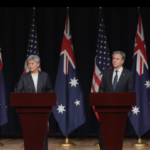Is Death by Firing Squad Ever Justified?

It’s the fate that awaits members of the Bali Nine, Andrew Chan and Myuran Sukumaran – and a penalty that has drawn widespread criticism from human rights advocates all around the world.
But in a move that has been labelled “backward and backwood”, the state of Utah in the USA signed new laws last week to bring back the gruesome penalty of death by firing squad.
Utah abolished the penalty of death by firing squad in 2004, however anyone sentenced to the death before 2004 was still able to choose to be executed by firing squad. Three people were killed by firing squad after the penalty was abolished – the last being convicted murderer Ronnie Lee Gardner in 2010.
The recent changes to the law make Utah the only other state aside from Oklahoma which allows for death by firing squad – albeit in limited circumstances.
Why Did Utah Bring Back the Firing Squad?
It might seem incomprehensible, but the decision to bring back the firing squad is primarily an economic one, based on the principles of supply and demand.
Following the decision in 2004 to get rid of the firing squad, prisoners convicted and sentenced to death were left with the only remaining option of death by lethal injection.
Traditionally, death by lethal injection involved the administration of a cocktail of drugs, with the composition varying from state to state. Drugs such as sodium thiopental, phenobarbital and propofol are commonly used to sedate and execute inmates. These drugs are usually produced by pharmaceutical companies based in Europe.
However, the European companies have succumbed to domestic opposition to the death penalty and made the decision to stop supplying the drugs to the US for execution purposes.
This has left a number of US states facing a shortage of lethal injection drugs and uncertainty in relation to future supplies. They have therefore been forced to turn to other methods – such as ‘knock-offs’ of the European drugs previously sourced.
The unfortunate side effect of this approach has been a number of ‘botched executions’ – including that of Arizona man Joseph Wood last year – due to the drugs being experimental and untested.
So, in its efforts to avoid these dire consequences, Utah has opted to bring back the firing squad.
However, it should be noted that lethal injection will remain the state’s first choice when it comes to executing prisoners – the new laws will only allow for the firing squad to be used where lethal injection drugs are unavailable 30 days before an execution is scheduled to take place.
Furthermore, it’s estimated that only an unlucky few will ever be subjected to the firing squad – as the law stands today, the death penalty in Utah is only available for the offence of aggravated murder, which involves intentionally or knowingly causing another person’s death in serious circumstances.
These circumstances include, but are not limited, to instances where a murder is carried out in a prison, where a great risk of death was caused to someone other than the victim or actor, or where the murder was committed in the course of carrying out another serious offence, such as robbery or murder.
Paving the Way for Other States
While Utah’s move is unprecedented, it may pave the way for other states to reconsider their approach to the death penalty in light of the shortage of lethal injection drugs.
Arkansas is another state thinking about bringing back the firing squad, while Tennessee is exploring the option of bringing back the electric chair.
Meanwhile, Missouri and Oklahoma are considering reintroducing gas chambers – despite a California court ruling that they are a “cruel and unusual punishment” in breach of the Eighth Amendment of the US Constitution.
The moves represent a backward step in the worldwide campaign to abolish the death penalty – one which has gained considerable momentum in recent months in light of the current Bali Nine ordeal.
It also counteracts recent efforts made by other states within the US – since 2007, 7 states have abolished the death penalty, while a further 3 have declared a moratorium on executions.
Human Rights Concerns?
If you think that death by firing squad sounds like a cruel and painful way to die, you’re not alone. Human rights groups around the US have expressed their outrage at Utah’s decision.
The American Civil Liberties Union has taken action against the measure, encouraging those dissatisfied with the decision to pen emails to the Governor.
Others have argued that the penalty represents a breach of the eighth amendment to the US Constitution, which prohibits the federal government from imposing cruel or unusual punishments. However, a number of Supreme Court decisions appear to have affirmed the position that the death penalty per se is constitutional.
Of course, the easiest way forward would be to abolish the death penalty altogether, but that is unlikely to happen in Utah anytime soon.
The Governor of Utah has defended his decision to bring back the firing squad, stating that “we regret anyone ever commits the heinous crime of aggravated murder to merit the death penalty and we prefer to use our primary method of lethal injection when such a sentence is issued. However, when a jury makes the decision and a judge signs a death warrant, enforcing that lawful decision is the obligation of the executive branch.”
Indeed, some argue that, in light of the recent botched injections, death by firing squad is a superior method of execution as it kills the subject more quickly – and there is less room for error.
Despite these assurances, supporters of human rights groups have continued to advocate for the complete abolition of the death penalty. But again, Utah’s recent decision represents a serious blow to the hopes of these individuals and organisations.






